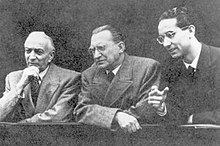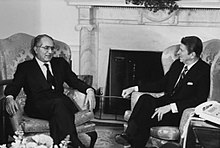Emilio Colombo
[3] He grew up, along with his six brothers, in a middle-class family; his father, Angelo Colombo, was a public administration's official, while his mother, Rosa Tordella, was a housewife.
In the same year, he obtained the classical lyceum diploma at the high school entitled to Quintus Horatius Flaccus in Potenza.
In September 1943, after the armistice, Colombo returned to Basilicata, starting his political commitment based on anti-fascist and Christian democratic principles.
[9] After two years, in the 1948 Italian general election, Colombo was re-elected in the country's Chamber of Deputies for his constituency with more than 43,000 votes.
[13] The reform proposed, through forced expropriation, the distribution of land to agricultural laborers, thus making them small entrepreneurs and no longer subject to the large landowner.
[14] If in some ways the reform had this beneficial result, for others it significantly reduced the size of farms, effectively removing any possibility of transforming them into advanced businesses.
[6] In 2003, then president Carlo Azeglio Ciampi bestowed Italy's highest political honour on him by nominating him senator for life.
The most oldest senator, former prime minister Giulio Andreotti was due to inaugurate the new legislature but his unavailability benefited Colombo.
















